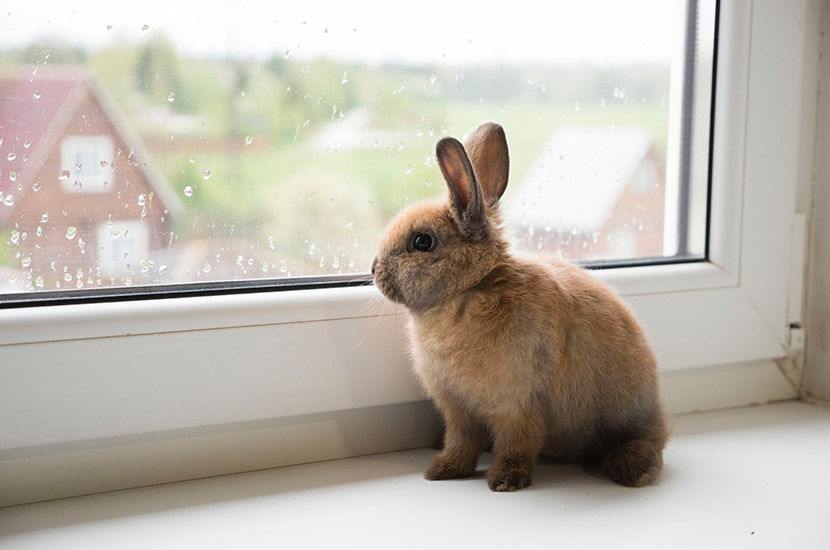by Dana Krempels, Ph.D.
Personality
One of the most common questions we receive is, “Are rabbits more like cats or dogs?” The best answer is…neither! Dogs and cats have been bred for centuries to lack innate fear of humans. Rabbits, however, have been bred primarily for meat, fur and physical characteristics. So, when you adopt a bunny, you adopt a lovely, domestic animal with the heart and spirit of a wild animal. It is more challenging to win the trust of this sensitive, intelligent creature than it is to win the heart of a puppy or kitten, which have been bred to trust you from birth.
The myth that certain rabbit breeds make better pets is just that: a myth. We have known aggressive lops (supposedly gentle and friendly), super-affectionate dwarfs (supposedly hyper and mean) and every type of personality you can imagine in our hybrids. There are as many rabbit personalities as there are rabbits!
If we had to compare the rabbit personality to that of another animal, we might say…horses! Rabbits are highly intelligent, interactive and affectionate. Once a rabbit bonds to a human family, she/he will be intensely loyal and loving—but may also sometimes be bratty or willful. A rabbit is very…rabbit. And rabbit people are special people who live happily with these complex, intelligent, and demanding little souls!
Bunny Handling – and Not
One of the most common misconceptions people have about rabbits is that they like to be held and cuddled. This is probably because they look like plush toys.
Many people are disappointed to learn that their bunny does not like to be held. But consider, for a moment, the natural history of the rabbit. This is a ground-dwelling animal, and prey item for many predators. It is completely against the nature of the rabbit to be held far above the ground where it cannot control its own motions and activities. When you force a bunny to be held against her will, you reinforce her notion that you are a predator who is trying to restrain her. Holding her while she struggles and kicks is not only dangerous for the human (sharp claws!), but also for the rabbit. We wish we didn’t know how many young rabbits come into our vet’s office with broken legs, necks and spines because people (usually children) insisted on carrying them around and handling them against their will. If you love your bunny, you won’t let this happen to him or her.
Unfortunately, many people buy rabbits without understanding their true nature. That is one of the main reasons these lovely, intelligent creatures are “dumped” shortly after they reached sexual maturity and begin to assert their strong personalities. But it’s easy and fun to live with a rabbit, once you understand the way they think.
Thinking Like a Rabbit
To understand rabbit behavior, begin to think more like a rabbit! Here’s a beginner’s guide…
- Buy a copy of The House Rabbit Handbook by Marinell Harriman (ISBN 0-940920-12-3). It is the most accurate, up –to-date book about rabbit care on the market.
- Remember that a rabbit, unlike a carnivorous, predatory dog or cat, evolved as a prey species. Hence, most rabbits are naturally shy. It is up to you, the flexible human, to compromise and alter your behavior so that the bunny learns you’re a friend. Once you have done this, you will have won the unending love and loyalty of one of the most special creatures in creation.
Many bunnies are naturally friendly and outgoing. Others are shy, at least at first. If you happen to have a shy bunny, here is the best way to win his or her trust.

